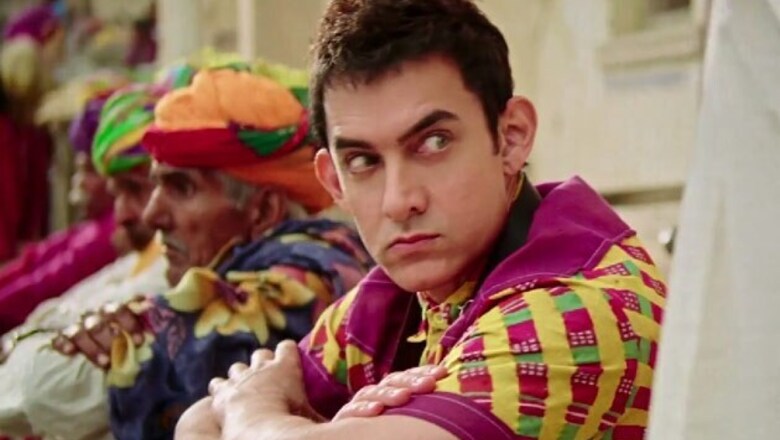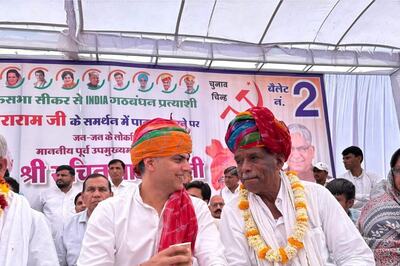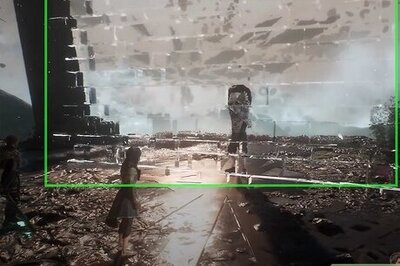
views
In less than a week, I've watched 'PK' twice. And I know that there are many like me who've done exactly the same. I'm neither a die-hard supporter of Aamir Khan, nor a true believer of films that have relevant life lessons for us to assimilate. But after watching the first day, first show of Rajkumar Hirani's latest directorial venture, I was certain about the fact that it is a special movie to reach for, that carries eternal re-watch value. So what exactly makes 'PK' watchable again and again? For some it is the structure of the film, for others the manner in which it entertained them so much that they wanted to search aspects that they may have missed earlier, and for many, the way it reflected on their spiritual beliefs.
The film, without any doubt, made my cry and laugh, it made me speak to someone who had watched it to discuss the topic of religion and how it is interpreted and sold in India. So yes, the cinematic experience changed and for the better when I viewed it for the second time. And trust me, even if you watch it a dozen times, the jokes don't get old but funnier, PK's quest for God not oh-already-seen but real.
The article now contains spoilers. If you haven't see the film, please come back to this article after you have.
Take a casual glance at international affairs and you wouldn't deny the fact that religion is the key reason for the strife across the globe. Yes, religion is a contentious issue and because it is important to determine an individual's identity, a threat to one's spiritual ideologies is interpreted as a threat to one's being. But filmmaker Rajkumar Hirani has been smart in dealing with it in the safest manner. With Boman Irani's dialogue 'Iss desh mei rehna hai toh religion se mat uljho', he explains how religion turns into a source of conflict when its interpretation is questioned. But the film 'PK' impresses its fans because of the manner in which it shows how religion can also play a strong peacemaking role. It is not about giving more importance to religion, but faith, the film states. The sequence - where Aamir Khan asks Tapasvi (played by Saurabh Shukla) to identify people belonging to different religious groups - is an effective way to put focus yet another important issue - religion being determined by what one wears and not faith. And with his most hard-hitting dialogue 'Dharam ka connection fashion se hai' , Aamir shows how religion is turning out to be the gap between people, to differentiate them and create barriers.
Much like Rajkumar Hirani's previous films 'Munnabhai MBBS', 'Lage Raho Munnabhai', '3 Idiots', the script of 'PK' flows like a gripping novel which you just can't put down. Because you are so involved in it, you just sit back and love it from the beginning till its end. What makes 'PK' the greatest script of 2014 is the fact that it doesn't end at the dialogue between people. But lays stress on wise observations on issues that carry significance in our lives. The film is convincing even as it criticises the society for its stupidity to resort to wrong ways to reach Him. Look at the screenplay carefully and you'd learn lessons to create compelling and memorable character conflict.
What makes Hirani the best is his ability to use satire to put people to shame for their wrong perspectives. He is not only great at differentiating between how people behave and how they try to justify their behavior in different situations, but also effective at making critiques on human nature by using the protagonist's observations and PK's own transformation from a naïve to a dishonest alien. One of the most unforgettable and interesting comment on human hypocrisy is when people show qualms in claiming a packet of condoms. Hirani's treatment of our hypocrite nature is honest and real. As we marinate in the film with PK, Hirani quite intelligently removes our pretensions layer by layer, until he tells us what we are in reality and challenges us to improve ourselves.
And honestly, there is nobody except Aamir who can be convincing at giving a microscopic analysis of the human nature. He is successful at making us own up flaws even though we think of ourselves as rational and virtuous beings. PK's fixed gaze compels a look at the complexities of our thought processes, religious beliefs and superstitions.



















Comments
0 comment